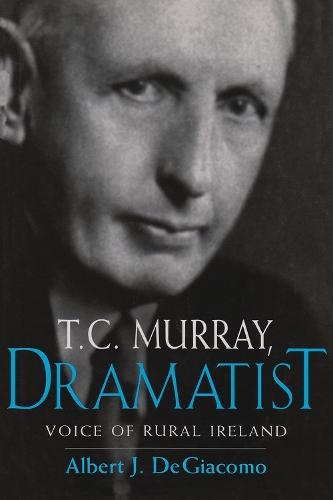Overview
Drawing on archives of libraries in Dublin, New York City and Boston, DeGiacomo assesses T.C. Murray's contribution to the Irish dramatic movement. One of the """"Cork Realists"""" of the Abbey Theatre, Murray wrote 17 plays in one, two or three acts. A prominent national teacher and a seemingly apolitical playwright in the Irish Literary Revival, Murray expressed nationalistic aspirations in his peasant tragedies. His characters' drive for self-determination and their religious consciousness mark Murray's dramatic landscape. Murray reveals his life in voluminous correspondence with friends, family members and the glitterati of Dublin. A Roman Catholic, Murray tells his """"outsider"""" story of the Abbey Theatre, ruled by members of the Protestant, Anglo-Irish ascendancy. W.B. Yeats, Lady Gregory and Lennox Robinson fill his world, as do later figures like Ernest Blythe. Murray's association with the amateur dramatic societies reveals yet another dimension of his commitment to Irish drama. This text, largely a work of theatre history, spans Murray's life and career from 1878 to 1959, and highlights Murray's plays on Abbey tours of America from 1911 to 1935.
Full Product Details
Author: Albert J De Giacomo
Publisher: Syracuse University Press
Imprint: Syracuse University Press
Dimensions:
Width: 16.10cm
, Height: 2.00cm
, Length: 23.50cm
Weight: 0.454kg
ISBN: 9780815629450
ISBN 10: 0815629451
Pages: 212
Publication Date: 01 January 2003
Audience:
College/higher education
,
Professional and scholarly
,
Undergraduate
,
Postgraduate, Research & Scholarly
Format: Hardback
Publisher's Status: Active
Availability: Out of stock

The supplier is temporarily out of stock of this item. It will be ordered for you on backorder and shipped when it becomes available.
Reviews
A second-generation playwright for Dublin's acclaimed Abbey Theatre, Murray enjoyed international popularity from 1912 to about 1950. While well crafted and deeply in contact with rural Irish life, his plays were classical in structure and maintained a strong unity of theme: the need for social, religious, and individual freedom. . . . [DeGiacomo] reveals, for instance, that Murray, a reclusive Roman Catholic schoolteacher, felt like an outsider among Abbey directors W. B. Yeats, Lady Gregory, and Lennox Robinson, who were all Protestant. In between the biographical portions are four chapters that examine 17 plays. . . . The first book-length survey of Murray, this is recommended for specialists in theater or Irish literature studies. -- Library Journal
"A second-generation playwright for Dublin's acclaimed Abbey Theatre, Murray enjoyed international popularity from 1912 to about 1950. While well crafted and deeply in contact with rural Irish life, his plays were classical in structure and maintained a strong unity of theme: the need for social, religious, and individual freedom. . . . [DeGiacomo] reveals, for instance, that Murray, a reclusive Roman Catholic schoolteacher, felt like an outsider among Abbey directors W. B. Yeats, Lady Gregory, and Lennox Robinson, who were all Protestant. In between the biographical portions are four chapters that examine 17 plays. . . . The first book-length survey of Murray, this is recommended for specialists in theater or Irish literature studies.-- ""Library Journal"""
A second-generation playwright for Dublin's acclaimed Abbey Theatre, Murray enjoyed international popularity from 1912 to about 1950. While well crafted and deeply in contact with rural Irish life, his plays were classical in structure and maintained a strong unity of theme: the need for social, religious, and individual freedom. . . . [DeGiacomo] reveals, for instance, that Murray, a reclusive Roman Catholic schoolteacher, felt like an outsider among Abbey directors W. B. Yeats, Lady Gregory, and Lennox Robinson, who were all Protestant. In between the biographical portions are four chapters that examine 17 plays. . . . The first book-length survey of Murray, this is recommended for specialists in theater or Irish literature studies. --Library Journal
Author Information
Albert J. DeGiacomo is an assistant professor in the English and Theater Department at Berea College in Kentucky. His articles have appeared in Irish University Review and Éire-Ireland.



